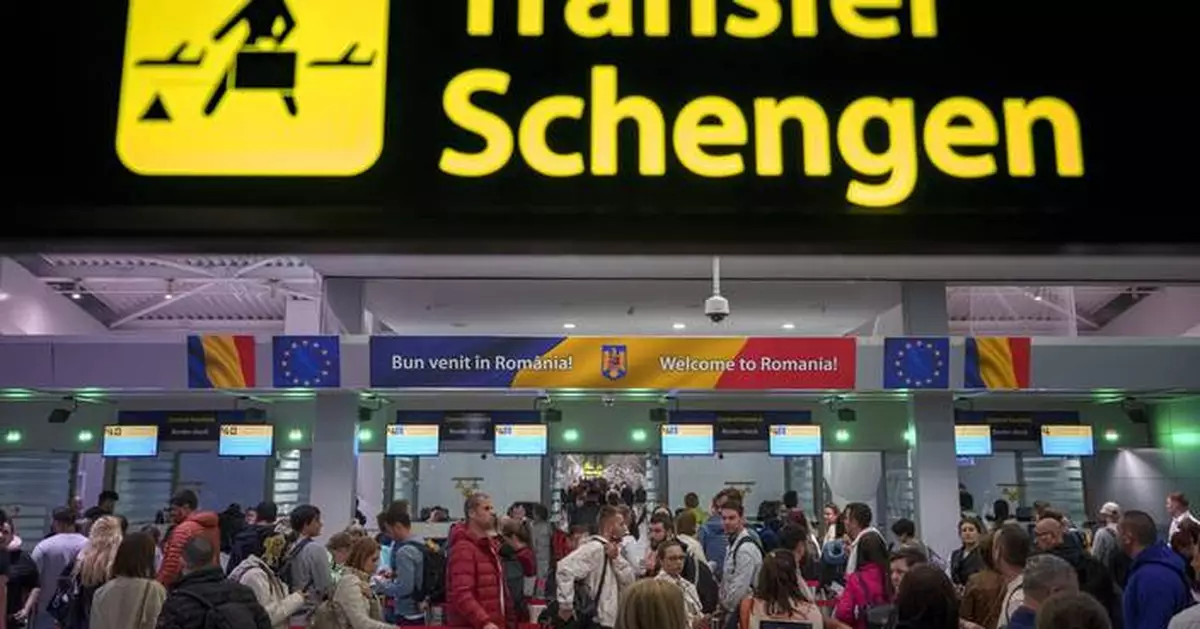SOFIA, Bulgaria (AP) — Romania and Bulgaria partially joined Europe’s ID-check-free travel zone on Sunday, marking a new step in the two countries’ integration with the European Union.
After years of negotiations to join the Schengen area, there is now free access for travelers arriving by air or sea from both countries. However, land border checks will remain in place due to opposition primarily from Austria which has long blocked their bid over illegal migration concerns.
EU Commission President Ursula von der Leyen hailed the change as a “huge success for both countries” and a “historic moment” for what is the world’s largest free travel zone.
The Schengen Area was established in 1985. Before Bulgaria and Romania’s admission, it was comprised of 23 of the 27 EU member countries, along with Switzerland, Norway, Iceland and Liechtenstein. Around 3.5 million people cross an internal border each day.
Austria vetoed Romania and Bulgaria’s admission into the Schengen zone at the end of 2022 but allowed Croatia full accession. Bulgaria and Romania joined the EU in 2007 and Croatia in 2013.
Siegfried Muresan, a Romanian Member of the European Parliament, told The Associated Press that it is “an important first step” that will benefit millions of travelers annually.
“Bulgaria and Romania have been fulfilling all criteria for joining the Schengen area for years — we are entitled to join with the terrestrial border as well,” he said, adding that it “will offer additional arguments to the last EU member state that has been vetoing the full accession.”
Romanian Prime Minister Marcel Ciolacu called it a “well-deserved achievement” for Romania that he said will benefit citizens who can travel more easily and will bolster the economy.
“We have a clear and firmly assumed government plan for full accession to the Schengen Area by the end of the year,” he said.
The EU’s executive branch, the European Commission, has said for more than a decade that Romania and Bulgaria both meet the technical criteria for full accession, which requires unanimous support from their partners. Both countries have agreed to implement random security screening at airports and maritime borders to combat illegal migration and cross-border crime.
“Bulgaria’s full accession to Schengen will happen by the end of 2024,” Kalin Stoyanov, Bulgaria's interior minister, told reporters on Sunday. “We showed and continue to show to illegal migrants that they should not take the road to Europe through Bulgaria."
The lifting of border control is expected to facilitate operations at Bulgaria’s four international airports, which in 2023 saw nearly 11 million passengers, according to official data.
The airport in the capital, Sofia, serves as the biggest hub for Schengen flights which constitute 70% of all flights, airport representatives said.
While the eased regulations are expected to positively impact the tourism sector, members of the European Parliament have voiced concerns about long queues at the EU’s land borders and the impact it can have on trade in the bloc’s single market, as well as the health and safety of drivers.
Truck drivers are frequently stuck in kilometers-long queues at the borders of both Romania and Bulgaria. The Union of International Carriers in Bulgaria estimates delays cost the sector tens of millions of euros each year.
McGrath reported from Sighisoara, Romania.

A journalist passes Non-Schengen automatic border control gates during a media tour at the Henri Coanda International Airport in Otopeni, near Bucharest, Romania, Sunday, March 31, 2024. Romania and Bulgaria joined Europe's passport- and visa-free Schengen Area, applying only to travelers arriving by air and sea. (AP Photo/Andreea Alexandru)

A passenger that arrived with a flight from Vienna shows his passport after being one of the first people to take advantage of Romania's entry in the Schengen Area without border checks by air and sea at the Henri Coanda International Airport in Otopeni, near Bucharest, Romania, Sunday, March 31, 2024. Romania and Bulgaria joined Europe's passport- and visa-free Schengen Area, applying only to travelers arriving by air and sea. (AP Photo/Andreea Alexandru)

Flight attendants arriving at the Henri Coanda International Airport pass under a Schengen Information sign, in Otopeni, near Bucharest, Romania, Sunday, March 31, 2024. Romania and Bulgaria joined Europe's passport- and visa-free Schengen Area, applying only to travelers arriving by air and sea. (AP Photo/Andreea Alexandru)

Passengers arriving at the Henri Coanda International Airport pass under a Schengen Information sign, in Otopeni, near Bucharest, Romania, Sunday, March 31, 2024. Romania and Bulgaria joined Europe's passport- and visa-free Schengen Area, applying only to travelers arriving by air and sea. (AP Photo/Andreea Alexandru)
NEW YORK (AP) — Even as many Americans say they learn about the 2024 election campaign from national news outlets, a disquieting poll reveals some serious trust issues.
About half of Americans, 53%, say they are extremely or very concerned that news organizations will report inaccuracies or misinformation during the election. Some 42% express worry that news outlets will use generative artificial intelligence to create stories, according to a poll from the American Press Institute and The Associated Press-NORC Center for Public Affairs Research.
The poll found 47% of Americans also expressing serious concern that news outlets would report information that has not been confirmed or verified, and 44% worry that accurate information will be presented in a way that favors one side or another.
Half of Americans say they get election news always or frequently from national news outlets, a percentage that is higher among older respondents, the poll found.
“The level of engagement is good,” said Michael Bolden, CEO of the American Press Institute. “The thing that's most concerning is that they're not sure they can actually trust the information.”
Years of suspicion about journalists, much of it sown by politicians, is partly responsible, he said. People are also less familiar with how journalism works. The poll found about half of respondents say they have at least a moderate amount of confidence in the information they receive from either national or local news outlets when it comes to the 2024 elections, though only about 1 in 10 say they have a great deal of confidence.
“There may have been a time when people knew a journalist because one lived on their block,” Bolden said. “The way the industry has been decimated, that's much less likely.”
Simply putting out the news often isn't good enough anymore, he said. There's a growing disconnect between news organizations and communities that the outlets need to address, by helping to let people know what journalists do and how people reporting news are their friends and neighbors, he said.
Outlets should lean into a convenor role, bringing people together for newsworthy events, he said.
About half of U.S. adults say they follow the news about presidential elections closely, with older adults being more engaged. About two-thirds of Americans age 60 or older say they keep a close eye on presidential election news, compared wth roughly one-third of those under age 30.
The same trend is seen with local and state election news. While the poll found that 46% of Americans age 60 or older say they follow news about local and state elections closely, only 16% of people age 18 to 29 said the same thing.
“As they transition to becoming older people, will they begin to care?” Bolden asked. “If they don't begin to care, what will that mean for local and state communities?”
Young people, those under age 30, are about as likely to get election news from social media or friends or family as they are to get it from national or local news outlets, the poll found. Black and Latino adults are somewhat more likely to express “a great deal” of confidence in the reliability of social media as a source of election news than white Americans are.
That's both a warning sign, since there is a lot more misinformation to be found on social media, and an opportunity for traditional outlets to make more of their work available this way, Bolden said.
About 6 in 10 Democrats say they get election news from national outlets at least frequently. That's more than the 48% of Republicans or 34% of independents, according to the poll. Republicans are more likely than Democrats and independents to express concern about inaccurate information or misinformation in news coverage during the upcoming elections. About 6 in 10 Republicans are concerned about this, compared with about half of Democrats.
Besides inaccuracies, many also expressed serious concern about election news that focuses too much on division or controversies or concentrates on who may win or lose — the horserace aspect of political coverage — rather than issues or the character of candidates.
Most Americans say that for them to make informed decisions about the 2024 state and local elections, they want national and local news outlets to highlight candidates’ values or their different positions on key social issues. In each case, about three-quarters of U.S. adults say they would like “a lot” or "some" coverage of these topics.
The poll of 2,468 adults was conducted March 21-25, 2024, using a sample drawn from NORC’s probability-based AmeriSpeak Panel, which is designed to be representative of the U.S. population. The margin of error is plus or minus 2.9 percentage points.
David Bauder writes about media for The Associated Press. Follow him at http://twitter.com/dbauder.

FILE - Journalists line the press stand before Republican presidential candidate former President Donald Trump speaks at a caucus night party in Des Moines, Iowa, Jan. 15, 2024. Attitudes toward the media and political news ahead of the election were explored in a poll from the American Press Institute and The Associated Press-NORC Center for Public Affairs Research. (AP Photo/Andrew Harnik, File)














